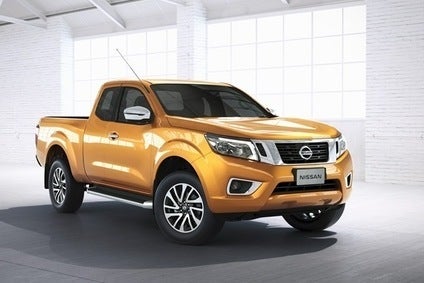
Mercedes-Benz will enter the one tonne pickup truck segment, as recently announced, with a variant of Nissan’s NP300 Navara/Frontier line, Daimler said on Tuesday. A version is also being developed for Nissan’s Alliance partner Renault and all three will be built in two plants in Europe and South America with planned output of 190,000 a year by the end of the decade.
Mercedes has previously rebadged the Sprinter large van as the Volkswagen Crafter and currently sells a variant of Renault’s Kangoo van as the Citan.

Discover B2B Marketing That Performs
Combine business intelligence and editorial excellence to reach engaged professionals across 36 leading media platforms.
Officially, Nissan and Daimler said they would jointly develop the midsize pickup truck and the Mercedes-Benz version would “share some of the architecture” with the NP300 Navara/Frontier, currently built in Thailand and Mexico.
The Mercedes-Benz would be “engineered and designed by Daimler to meet specific needs of its customers” in “Europe, Australia, South Africa and Latin America”.
The trucks will be built at Nissan’s commercial vehicle plant in Barcelona, Spain, and a Renault plant in Cordoba, Argentina.
The pickup will have a double cab and will be targeted both at private and commercial customers.
Daimler chairman Dieter Zetsche said: “Entering the rapidly growing segment of midsize pickups is an important step in continuing our global growth path. Thanks to our well-established partnership with the Renault-Nissan Alliance, we are able to drastically reduce the time and cost to enter this key segment.”
Nissan’s current NP300 is sold as the Navara and Frontier (depending on market), was launched in June 2014 and is currently produced in Thailand and Mexico.
Nissan and Renault are already developing a one tonne pickup truck for Renault which will also share some common architecture with the NP300. The truck, which will have a distinctive Renault design, is the brand’s first one tonne pickup truck as well. Production will begin in 2016 at Nissan’s plant in Cuernavaca, Mexico. It will mark Renault’s second entry into the pickup segment after the launch of a half tonne model later this year.
The Mercedes-Benz one tonne pickup truck will be built by Nissan in the Renault plant in Cordoba, Argentina, along with the Nissan Frontier and the Renault version, for Latin America. The three trucks will also be built in the Nissan plant in Barcelona, Spain, for other markets, excluding North America. Production of the trucks at the two plants will start by the end of the decade.
Barcelona will produce about 120,000 vehicles annually for the three partners, while the Cordoba plant will produce nearly 70,000 vehicles a year. A high parts localisation rate is expected to expand the supply bases in Spain and Argentina significantly.
“Thanks to our cooperation with Daimler on this project, we will be able to share the cost of investment at the Cordoba plant, while at the same time open up new markets in the Latin American region for the Renault-Nissan Alliance,” said Carlos Ghosn, Renault-Nissan chairman and CEO.
“This project will also allow us to optimise production capacity at the Barcelona plant and enhance our competitiveness in an important segment.”
The pickup project is the latest in the strategic partnership between Daimler and the Renault-Nissan Alliance, which began on 10 April, 2010. At the time, the scope of the collaboration was limited to three projects primarily focused on Europe. Since then, the combined portfolio shared between Renault-Nissan and Daimler has more than quadrupled to 13 projects in Europe, Asia and the Americas.
“After five years of cooperation between Daimler and Renault-Nissan, my conclusion is by all means positive,” Zetsche said. “We have identified and launched many joint projects that create benefits for all partners involved.”
“This cooperation is one of the most productive in the auto industry, enabling all partners to increase economies of scale while keeping our brands and products distinct,” Ghosn said.






